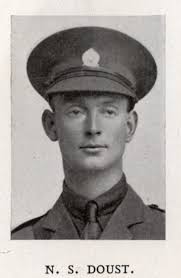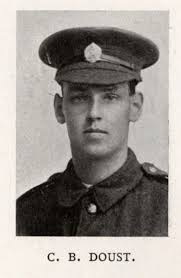His brother Charles was killed in the WW1 in 1916.
Full story below:
----------------------------------------------------
Private Norman Shellibeer Doust (24 Dec 1889-20 June 1918). Royal Flying Corps
2nd Lieutenant Charles Bowden Doust (26th October 1887- 1st July 1916). 5th (City of London) Battalion, London Regiment (London Rifle Brigade)
The brothers were both educated at Dulwich College and lived at Tregothnan, Rydal Road,Streatham.
Norman was born on December 24th 1889, the younger of two sons of Charles Doust, an export merchant on the 1901 census listed as a Colonial Commission merchant , and his wife Laura. He went to Dulwich College from the Prep, two and a half years after his elder brother, Charles, had made the same transition. Having left in 1905, after just under two and a half years as a pupil, he went to Paris the following year, spending the next three years working in a wool manufacturing firm there. After this he subsequently spent two years working in a commercial house in New York, before returning to London in 1912 in order to take up a position in his father’s firm.
On August 6th 1914, two days after the declaration of war, both Norman and his elder brother Charles signed up as privates in the London Rifle Brigade, and were sent to France for the first time in the November, spending the winter in the trenches. He was invalided home during the second Battle of Ypres, and after a period of recuperation in Bristol was offered a commission; he turned this down, however, instead transferring to the Royal Flying Corps. In July 1916 he returned to the front with the R.F.C. for the first time, and had been serving with them for almost a year when, in late June 1917, he was taken ill.
After a period in hospital in France, Norman was returned home with what was suspected, and later confirmed, as being tuberculosis. He was officially discharged on August 7th, and passed away in a sanatorium near Bournemouth the following year, on June 20th 1918. His brother Charles, who had stayed with the London Rifle Brigade, had been killed during the first day of the Somme.
(Source Dulwich College)


